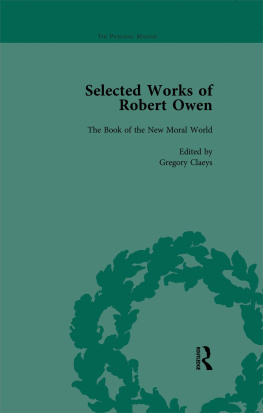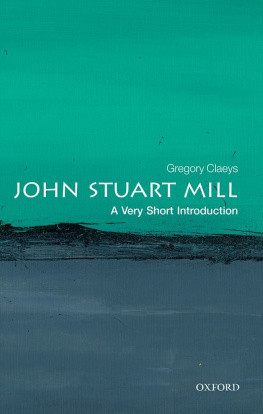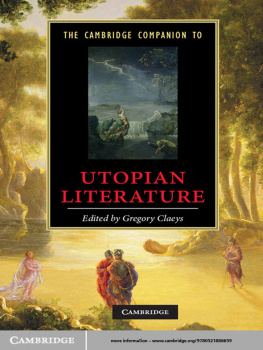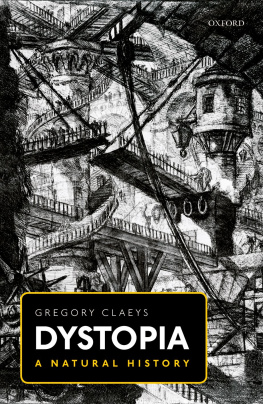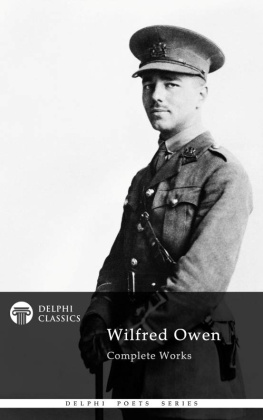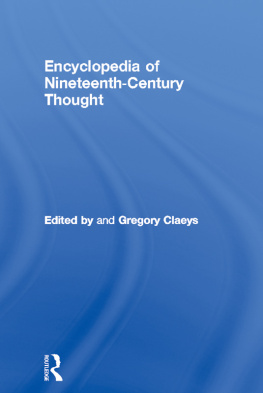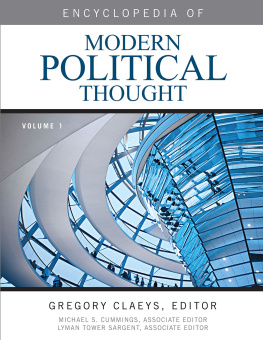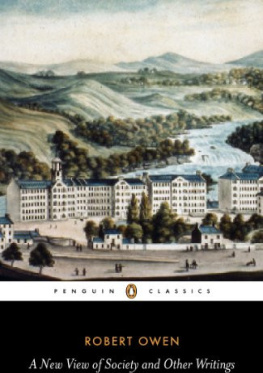First published 1993 by Pickering & Chatto (Publishers) Limited
Published 2016 by Routledge
2 Park Square, Milton Park, Abingdon, Oxon 0X14 4RN
711 Third Avenue, New York, NY 10017, USA
Routledge is an imprint of the Taylor & Francis Group, an informa business
Taylor & Francis 1993
General Introduction Gregory Claeys 1993
All rights reserved, including those of translation into foreign languages. No part of this bookmay be reprinted or reproduced or utilised in any form or by any electronic, mechanical, or other means, now known or hereafter invented, including photocopying and recording, or in any information storage or retrieval system, without permission in writing from the publishers.
Notice:
Product or corporate names may be trademarks or registered trademarks, and are used only for identification and explanation without intent to infringe.
British Library Cataloguing in Publication Data
Owen, Robert
Works of Robert Owen. (Pickering Masters Series)
I. Title II. Claeys, Gregory III. Series
335.0092
ISBN: 978-1-851-96088-0 (set)
Typeset by Waveney Typesetters
Norwich
TO
HIS MAJESTY, WILLIAM IV.,
KING OF GREAT BRITAIN, etc.
SIRE,
CIRCUMSTANCES, not under your controul, have placed you at the head of the most powerful association of men for good or for evil, that has hitherto existed in any part of the globe; and other circumstances are about to arise, also beyond your controul, which will render it necessary for you, Sire, and those whom you may call to your councils, to decide whether this power shall be now directed to produce the good or the evil.
The book, the first part of which, with this letter prefixed, I submit to your Majesty, contains truths, of the highest import to you, Sire, to every member of your family; to every subject of the wide-spread empire over which you preside; to every human being, high or low, now living and to all those who shall live hereafter. It unfolds the fundamental principles of a new moral world, and it thus lays a new foundation on which to re-construct society and re-create the character of the human race. It opens to the family of man, without a single exception, the means of endless progressive improvement, physical, intellectual, and moral, and of happiness, without the possibility of retrogression or of assignable limit.
Society has emanated from fundamental errors of the imagination, and all the institutions and social arrangements of man over the world have been based on these errors. Society is, therefore, through all its ramifications, artificial and corrupt, and, in consequence, ignorance, falsehood, and grave folly, alone govern all the affairs of mankind.
Under your reign, Sire, the change from this system, with all its evil consequences, to another founded on self-evident truths, insuring happiness to all, will, in all probability, be achieved; and your name, and the names of those who now govern the nations of the world will be recorded, as prominent actors, in a period the most important that has ever occurred in the history of mankind.
The world, in its present mental darkness, will rashly pronounce this change to be impracticable; or, if practicable, that it will be the work of ages. Herein all men err. The great circumstances of nature, and the existing state of human affairs, are full ripe for the change; no one material is deficient, and man cannot longer govern man without forming a union of governments and nations to effect this change.
As the change will be permanently beneficial for high and low, rich and poor, it may be effected by wise general arrangements, in peace, in order, and with high gratification to all nations and people.
At the termination of the late war of, what are called, the civilized nations, an alliance was formed by the leading governments to protect each other from individual national revolutions;a and it was a wise measure to prevent premature changes in each state changes desired by the people before they had acquired wisdom to give such changes a right direction.
The world has undergone a revolution of principle since that alliance was formed; the folly and wickedness of all wars, civil or national, have become too glaring not to be opposed by the cultivated mind of Europe and America. The empire, Sire, over which you preside, can no longer be governed by party proceedings, and, in consequence, your present administration, as well as any other that can now be formed, must be one of mere necessity; because, in the present state of society, individuals cannot be found to constitute one that shall be efficient. Difficulties of a similar character are arising in all countries; the old prejudices, or errors of the world, have been shaken to their foundation, and are tottering previous to their fall and final destruction.
A union of governments and nations is now required, to reconstitute society upon a new and solid basis, and to secure to the human race peace and happiness, through the right application of the discoveries, both scientific and moral, made within the last century.
Your ancestors, Sire, a hundred years ago, directed a mixed manual and scientific national power for the production of wealth and happiness, equal together to the exertions of about fifteen millions of men, to supply a population of about fifteen millions: the population and power being equal, or as one to one. You, Sire, have the direction of a mixed national power of production more than equal to the exertions of six hundred millions of men, with no assignable limit to its rapid increase, to supply a population of twenty-five millions, or as twenty-four to one. This enormous new power of the British Empire may be most advantageously given to all other populations in proportion to their number, and it is the immediate interest of Great Britain that this new power should be spread, as rapidly as possible, over all the nations of the earth. It is a boon that will be more beneficial to the givers than to the receivers.
The British nation is in the most advantageous position to propose and negotiate this alliance, now called for by an irresistible necessity, arising from the progress of knowledge. This alliance is imperative, to protect, alike, both the governments and people from the effects of ignorant violence, and to insure their progressive improvement and happiness.



